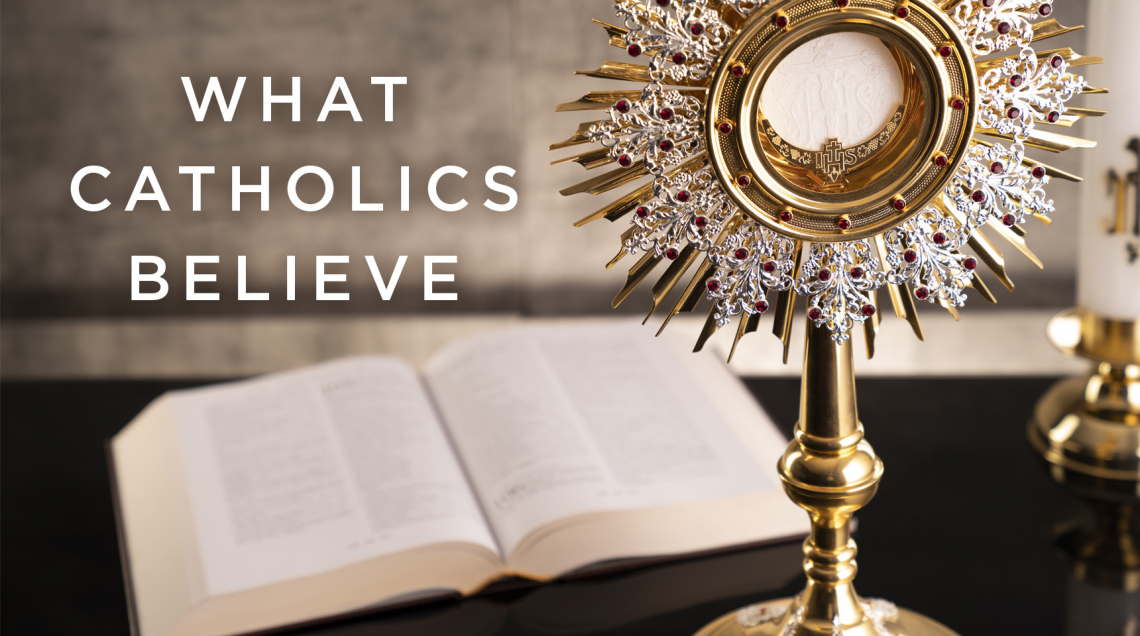The Nicene Creed- An Introduction

What does it mean to be a Catholic Christian? Is it something that is defined by each individual Christian, or is it something that defines me as a Christian?
Many people speak of themselves as relativists. They say that each person should be able to determine for himself or herself what is right or wrong. But few people are consistent about this. If you violate what someone else perceives as his or her rights, you will hear about it. They will expect you to know and acknowledge those rights, or you can expect to be sued. So much for relativism! What they really mean is not relativism but egoism – whatever happens to suit me and my wants at any specific time.
Yet, even many secular people are not satisfied with raw egoism as a way of life. People sense a need to look to some standards beyond themselves – standards they did not invent – which can shed light on their lives. For example, many Americans look to the Declaration of Independence, the Gettysburg Address, President Kennedy’s Inaugural Address, or Martin Luther King’s “I Have A Dream” speech to help them define what it means to be an American. A couple’s wedding vows help them summarize and express the core meaning of the love they are promising each other, vows which, in turn, help shape how the couple will live with and love one another in the future.
As Catholic Christians, we believe in a God who acts in human history. God has revealed something of who He is, what the world is, why the world is as it is, and what God is doing about it. All this, and more, God has revealed to witnesses who have faithfully passed down this revelation through the generations to the present day. We find this revelation expressed primarily in sacred Scripture and sacred tradition. Sacred tradition includes the dogmatic teachings of the Church, its liturgical celebrations, its life of prayer and devotion, and other aspects of Church life. We, as Catholic Christians, are called to accept and believe all this and allow ourselves to be shaped and reshaped by it.
Scripture and tradition cover a vast field of topics. From the time when a scribe asked Jesus what was the first commandment of the Law, Christians perceived a need to summarize their most important beliefs in a brief statement that could be easily learned and that could serve as a means of interpreting everything else. This need was especially felt when dealing with people who were attracted by Christ and/or Christianity and thus came forward, seeking to be baptized and become Christians. They were looking for summaries of Christian faith that would be relatively easy to learn and which would also serve as a basis for how to understand everything else in our faith.
Thus, were creeds born.
The Nicene Creed, which we will be exploring together in a series of articles, has a preeminent place among our creeds. It was formed by a blending of baptismal creeds with the precise theological language that came from the Councils of Nicaea (325 AD) and Constantinople (381 AD). In later years, the Nicene Creed became incorporated into the Mass. It is accepted as a rule of faith not only by Roman Catholics but by Anglicans, many Protestant denominations, and (except for one phrase that was added later) by the Orthodox churches.
Note that the Nicene Creed is not a complete summary of Catholic Christian belief. The Eucharist, the source and summit of Christian life, is not explicitly mentioned. Nor is prayer or the moral life. Note also what the Nicene Creed does focus on. Most of it is about who God is. This was a deliberate choice on the part of the early Church Fathers.
On the one hand, all Christians needed some help in expressing how God is truly One (as both Old and New Testaments affirm) and how, at the same time, the Father, the Son, and the Spirit could all be truly God. This was not merely an academic question or a game of semantics. Everything else in our faith depends on having as clear an understanding (as is humanly possible) of who God is. Moreover, we are created in God’s image and likeness. Knowing more about God shows us more about who we are called to be and how we are called to live. The Nicene Creed, then, has a great deal to tell us about God and about ourselves as human beings and as believers.
I invite you to join me in exploring the Nicene Creed, slowly, step-by-step. My hope is that these articles will help you to understand the Creed and to pray it more deliberately and meaningfully at Mass. The Creed has a great deal to teach us about God and about ourselves. Let us give it the time it needs to teach us.
In the meantime, I leave you with a quote from The Creed, a book by Luke Timothy Johnson, where he reflects on what we are doing when we recite the Nicene Creed:
In a world that celebrates individuality, (Christians) are actually doing something together. In an age that avoids commitment, they pledge themselves to a set of convictions and thereby to each other. In a culture that rewards novelty and creativity, they use words written by others long ago. In a society where accepted wisdom changes by the minute, they claim that some truths are so critical that they must be repeated over and over again. In a throwaway, consumerist world, they accept, preserve and continue tradition. Reciting the Creed at worship is thus a countercultural act. (The Creed, pp. 40-41)
By: Father Mark P. Nolette, a priest/hermit of the Diocese of Portland, who resides in Pittsfield and does part-time ministry at Our Lady of the Snows and St. Agnes parishes. Father Nolette also writes a regular blog, which can be found at www.thanchorite.net.










